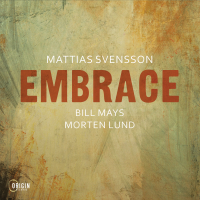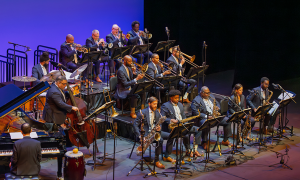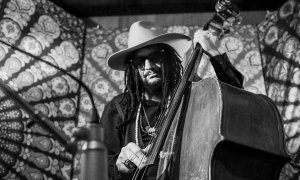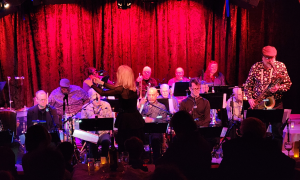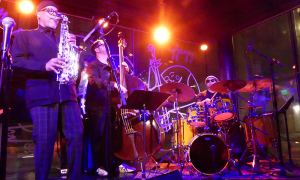Home » Jazz Articles » Live Review » Maria Schneider Orchestra at Herbst Theater
Maria Schneider Orchestra at Herbst Theater

Courtesy Briene Lermitte
Herbst Theater
SFJAZZ Spring Season
San Francisco, CA
March 2, 2023
These days only a few touring jazz orchestras exist, and those that do stand apart. Maria Schneider's 18-member ensemble, the Maria Schneider Orchestra Orchestra is one of these. The 59-year-old composer has an impressive résumé. She was raised in Windom, Minnesota, a tiny town with a river running through it. It was named after Senator Windom (1827-1891), who also served as Treasury Secretary under three presidents. As her asides (and poetry quotes) related to the audience during concerts reveal, Schneider still treasures those memories, and her rural Minnesotan upbringing still influences her. After graduating with a Master's in music from the Eastman School of Music, the legendary jazz composer Gil Evans hired Schneider to write copy and to serve as his personal assistant. Following an NEA Apprenticeship Grant, which permitted her to study with composer and musician Bob Brookmeyer in 1985, she moved to New York City. Founding her orchestra in 1992, she released the first of what was to be many Maria Schneider Orchestra releases in 2000.
Schneider has been stellar in her advocacy for the natural world (she is an avid birdwatcher) and in her opposition to what she views as tech multinational hegemony over the music industry. In 2020, she told Billboard: "Early on, I became very aware that big data companies were using musicians as carrots so that they could gather data from users. And this has been a huge frustration for me. It has really destroyed the music industry for those that make the music, and now I feel that for our society at large it's a catastrophic loss."
Because the orchestra retains a number of original members, and Schneider has developed and maintained a camaraderie with them over the years, she has been able to tailor compositions to specific soloists and their instruments. This can make replacements tricky. Following pianist Frank Kimbrough's death in 2020, Schneider had to move Gary Versace, an accomplished keyboardist who also is a master of the organ and the accordion, to the piano and replace him with the highly talented Julien Labro, renowned for his mastery of the accordion and the bandoneón, in both jazz and classical music genres, to Versace's post as accordionist.
SFJAZZ was fortunate enough to be able to bring Schneider to San Francisco for an evening performance. The blond Schneider, clad in all black, entered stage left to stand at the center ready to conduct. First up was "A Potter's Song," a tune written to commemorate the late trumpeter and Schneider collaborator Laurie Frink. It appeared on the orchestra's highly acclaimed CD The Thompson Fields (ArtistShare, 2017). "A Potter's Song" commenced with a lyrical accordion solo by Labro, and concluded with trumpet and some added tinkling on the piano by Versace.
"Look Up," a tune from the epic two-CD set Data Lords (ArtistShare, 2022) followed. Schneider's piece is intended to remind us of the connection to our natural environment. "Look Up" featured accomplished drummer Johnathan Blake holding down the beat, along with several trombone solos from Marshall Gilkes and baritone sax highlights by Scott Robinson, a living master of this and other saxophones.
Schneider related that the next song, "CQ, CQ. Is Anybody Out There?," was based on her father's ham radio hobby. Intended to mimic Morse code tones, the composition featured trumpet as well as Robinson's solo on baritone. When translated from the code, the music spells out "SOS," "power," "greed" and, of course, "Is anybody out there?"
"Sputnik," the next number—both in the show and on the first disc of the "Data Lords" set—is meant to reflect the competition, among tech companies and nations alike, to launch innumerable satellites into space. It featured Robinson holding forth once more on spirited baritone. "Sputnik" won a 2021 Grammy Award for Best Instrumental Composition.
For "Stone Song," which appears on the second CD of the Data Lords" set, drummer Blake played a ceramic sphere with stones inserted, an instrument created by ceramicist Jack Troy. "Stone Song" featured piano, bass and accordion; the horn section provided percussive elements.
"Gumba Blues," from the orchestra's initial release in 1994, featured Ryan Keberle on trombone, Ben Monder on guitar, and a solo by pianist Versace, underpinned by Jay Anderson's bass. The tune was prefaced by praise of poet Ted Kooser, a former United States Poet Laureate whose tome "Winter Morning Walks" was featured on Scheinder's highly lauded CD "Winter Morning Walks" (ArtistShare, 2013). This collaboration with soprano Dawn Upshaw received a Grammy for Best Contemporary Classical Composition.
"The Sun Waited for Me," another tune from Data Lords and one inspired by the poetry of Ted Kooser, was dedicated to saxophonist and composer Wayne Shorter whose death had been reported that day. Schneider said that "the day Wayne Shorter was born, the sun must have been waiting for him." It featured Robinson, once more, on baritone.
The evening drew to a close with "American Crow," a composition commissioned by the Schwartz Center for Performing Arts at Emory University for its 20th anniversary season. The composition is a cry for dialog, in the midst of a society where two sides now just shout at one another, something which greatly frustrates and perturbs Schneider.
It was followed by a standing ovation, with both musicians and the crowd taking to their feet. The orchestra encored with a new composition called "Walking by Flashlight."
Tags
Live Review
Maria Schneider
Harry S. Pariser
United States
California
san francisco
Maria Schneider Orchestra
Bob Brookmeyer
Frank Kimbrough
Gary Versace
Johnathan Blake
Marshall Gilkes
Scott Robinson
Ryan Keberle on trombone
Ben Monderon
Jay Anderson
Wayne Shorter
About Maria Schneider
Instrument: Composer / conductor
PREVIOUS / NEXT
Support All About Jazz
 All About Jazz has been a pillar of jazz since 1995, championing it as an art form and, more importantly, supporting the musicians who make it. Our enduring commitment has made "AAJ" one of the most culturally important websites of its kind, read by hundreds of thousands of fans, musicians and industry figures every month.
All About Jazz has been a pillar of jazz since 1995, championing it as an art form and, more importantly, supporting the musicians who make it. Our enduring commitment has made "AAJ" one of the most culturally important websites of its kind, read by hundreds of thousands of fans, musicians and industry figures every month.















